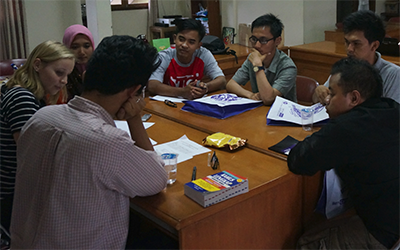Guest post by Siobhán Bubner, MenCare+ Indonesia
Across the world, men have become trapped in patriarchal systems that endorse hegemonic masculinity and maintain rigid definitions of what it means to be “a man.” This culture of male supremacy and dominance perpetuates gender inequality and power imbalance, manifesting itself in the widespread perpetration of gender-based violence.
In Indonesia specifically, long-lasting conservative attitudes and societal expectations are partially responsible for the continuation of gender-based violence. Data from the Indonesian National Commission on Women reported 216,156 cases of violence against women in 2012, with the majority of these in the form of domestic or intimate relationship violence. Considering that many more cases go unreported, even a conservative estimate would place the real world figure at a significantly higher amount.
A mounting body of evidence suggests that engaging men in positive masculinity, the progressive reconstruction of traditional male norms, is a key factor in achieving the empowerment of women.
Recognizing this, Rutgers WPF Indonesia breaks down harmful stereotypes through educational outreach programs, promoting the role of men as supportive husbands, fathers and partners to prevent violence against women and reassert the importance of family wellbeing.
One such program is Rutgers’ recently launched campaign, Generasi Jagoan Tanpa Kekerasan, which roughly translates to “Generation of Young Men Without Violence.” Adolescent males the world over struggle living up to societal expectations of masculinity. This pressure is particularly prominent in Indonesia, where young men are known to act out aggressively in an attempt to meet these expectations. The Generasi Jagoan program educates men from the ages of 15 to 24 on the issues of masculinity, gender inequality, and gender-based violence, offering impressionable young minds a constructive model to follow. This increases the likelihood of producing long-lasting and positive behavioral changes, creating a generation of “jagoans” who are gender-sensitive and non-violent in the process.
In January 2015, Rutgers WPF Indonesia piloted their Generasi Jagoan program, which facilitated a four-person focus group discussion (FGD) in Yogyakarta, made possible through collaboration with their local partner organization, Rifka Annisa. Participants were from a middle-class socioeconomic background and aged from 19 to 23. Rutgers questioned participants as to their perceptions regarding gender roles, gender-based violence, and masculinity in Indonesian society, then exposed them to educational material regarding these issues. This material included a short video clip, two posters and a souvenir bag with T-shirt, hat, badge, booklets, and stickers.
The results of the pilot program revealed that participants viewed gender-based violence to be the result of social and cultural influences, and unjustified in most situations. They disapproved of male aggressiveness and dominance in society, though acknowledged that there were men in their environments who regularly demonstrated these characteristics.
Participants subscribed to the traditional values wherein women were primarily responsible for household duties, while men acted as the main source of income and head of the family. Interestingly, they were open to the idea of women contributing financially to the household and to men helping out with the domestic workload.
While this demonstrates a progressive mindset, the belief that women should maintain the role of housewife places restrictions upon their involvement in the public sphere, as well as limiting their personal growth and career opportunities. It creates an unequal platform in the household where the man holds the majority of power and simultaneously places the burden on him to provide for the family. This patriarchal attitude prevents women from being considered truly equal by their partners, rendering them vulnerable to domestic abuse and violence.
It was disheartening to see that while participants regarded violence against women as wrong and immoral, they were accepting of its place in society. They seemed to face gender-based violence as if it were an inevitable, unchangeable part of their culture, expressing a will to change but limited power and tools to forge a new reality.

This is why the Generasi Jagoan campaign is necessary. By assisting young men to re-evaluate gender roles and giving them courage to fight back against gender-based violence, the campaign has the potential to contribute to shaping a society with a greater respect for women and equality within both public and private domains.
The most positive result from the FGD was the finding that participants were not only responsive to, but also encouraging of the initiative to redefine the concepts of masculinity and “jagoan”. They appreciated the opportunity to discuss these issues amongst their peers, as well the chance to critically reflect on their own beliefs.
The encouraging outcome of the pilot demonstrates that young men in Indonesia are ready and willing to embrace positive change, adding their voices to the fight for gender equality. Eliminating violence against women has long been an uphill battle, with men previously playing a large role in exacerbating the problem. It would seem, though, that the tides are beginning to turn, and with the support and guidance of programs like Generasi Jagoan, men can now become a part of the solution.